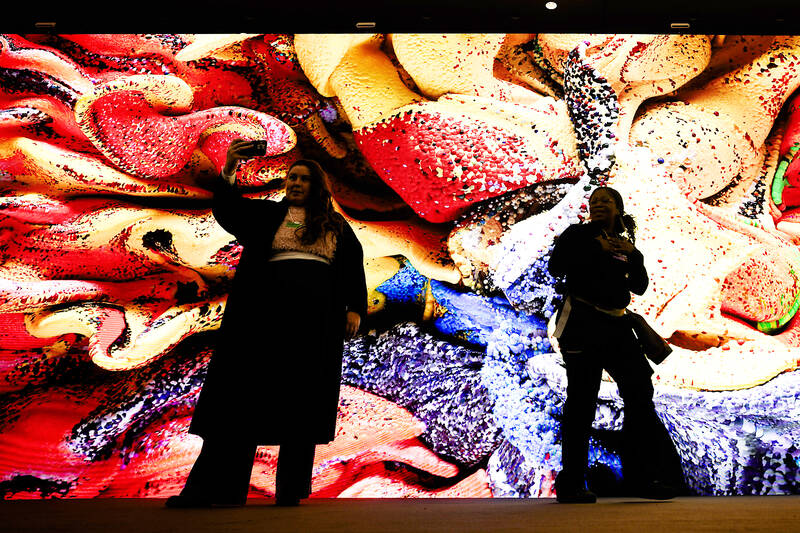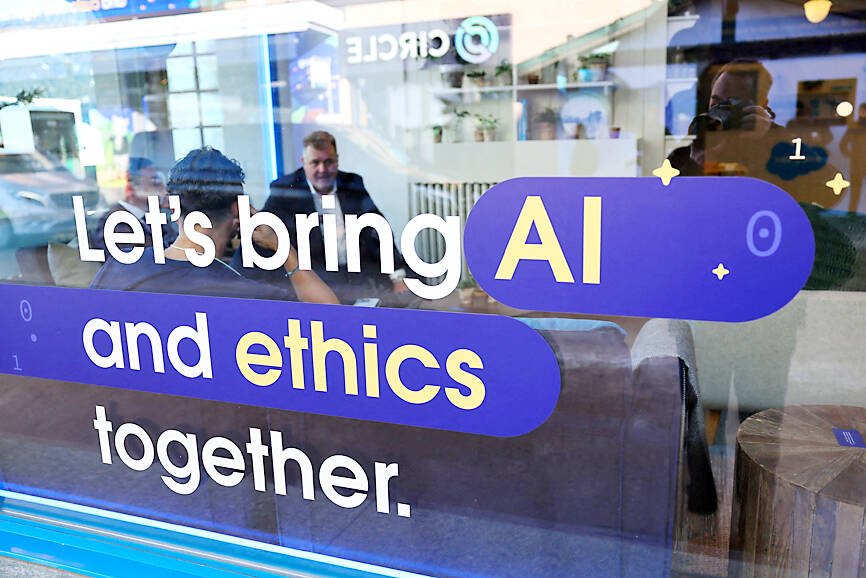A TikTok tarot card reader gazes at me through the screen and draws a card.
“If you’re seeing this,” she coos, “it was meant for you.” And in a sense, she’s right. But it wasn’t fate that brought me here, it was an algorithm.
Spirituality and mysticism have long found a home online, but the rise of generative AI and personalized content recommender systems are making it easier than ever to project a sense of magic upon technology.

Photo: AP
As the Arthur C Clarke quote goes: “Any sufficiently advanced technology is indistinguishable from magic.”
Anyone who has been served content that feels eerily perfect for them might have wondered at the mysterious omnipotence of The Algorithm. And while there’s nothing inherently wrong with experiencing a sense of wonder in the face of technological advancement, or even using digital technologies to enhance a spiritual practice, collapsing magic and technology can be risky.
‘ASK THE STARS’

Photo: Reuters
Off the back of OpenAI’s large language model GPT-4, many religious and spiritual spinoff chatbots have emerged. You can get BibleGPT to write personalized Christian poetry, use Jesus AI to, as the website claims, have “meaningful conversations with Jesus Christ” and chat with WitchGPT about paganism.
“Welcome to the void” beckons the popular astrology app CoStar in its own latest chatbot feature, encouraging users to seek generated guidance for a fee of about US$1 per question. Choosing from a list of suggested prompts, I “Ask the Stars” if I have a secret admirer. “No,” it tells me (rude).
In true CoStar fashion (the app is famously sassy) it also rebukes me for having asked the question at all, suggesting I should instead find gratitude in what I already have.
These examples are at best a bit silly and probably harmless. At worst, they reveal grifters out to make a buck by manufacturing a sense of insight or enlightenment by leveraging the human tendency to anthropomorphize technology or by gaming social media engagement algorithms.
But among the chaff there are also people forming genuine spiritual communities and engaging in witchcraft and other sacred traditions online. As with many subcultures, social media can be both a blessing and a curse: it can enable otherwise disparate groups to connect, but can also lead to the diminishment or adulteration of cultural practices.
Feminist anthropologist Emma Quilty, who has forthcoming books on magic and technology, makes a distinction between those that focus on the collective and those that push a “neoliberal spirituality” which aligns itself with hyper-individualistic ideas of self-improvement.
This edges uncomfortably close to commercialized forms of self-care, utterly divorced from its Black radical feminist roots and redirected towards a capitalist cooption of wellness. Quilty highlights how trends fueled by social media can also result in practices becoming detached from the (usually eastern) religious traditions and cultures they are imported from, and in some cases lead to unsustainable market demand for products such as crystals and white sage smudge sticks.
None of this is to say that it’s impossible to develop meaningful spiritual communities and practices online nor that it’s impossible to have a profound experience using digital tools.
I’m not interested in dismissing where and how people derive meaning. Yet it’s important to remember that technologies including large language models and personalized recommender systems are ultimately designed to generate value from their users.
Any profound experience from these tools comes from us — the humans — not the tool. As Quilty notes: “Something can be positive, helpful or even empowering on an individual level, but can still be harmful at a broader societal level, because of the underlying interests and imperatives of those building and implementing the technology.”
MAGIC AND TECH
Indeed we can get into treacherous waters pretty quickly when we misattribute magic to technology. It plays right into the hands of companies that would rather us be awestruck by a shiny user interface and smooth convenience and not peep behind the curtain to reveal a crotchety old man holding things together with overblown marketing language and regular old profit-driven data extraction.
When magical thinking about technology spreads to the level of policymaking, it can become dangerous. Too often governments and companies alike are quick to turn to technology as a silver-bullet solution to complex social problems. And when the real limitations and consequences of technologies are ignored — such as how automation can exacerbate social inequalities, or how
ChatGPT couldn’t function without stealing copyrighted material, or that automated content moderation relies on exploited invisible workers — we end up with policy that fails to rein in the worst of tech’s ails and relegates the more complex but necessary policy interventions to the background, all overshadowed by the magical allure of technology.
Technology isn’t a cure-all for social ills, and can, when misused for personal gain, cause great harm — just like magic.

This is the year that the demographic crisis will begin to impact people’s lives. This will create pressures on treatment and hiring of foreigners. Regardless of whatever technological breakthroughs happen, the real value will come from digesting and productively applying existing technologies in new and creative ways. INTRODUCING BASIC SERVICES BREAKDOWNS At some point soon, we will begin to witness a breakdown in basic services. Initially, it will be limited and sporadic, but the frequency and newsworthiness of the incidents will only continue to accelerate dramatically in the coming years. Here in central Taiwan, many basic services are severely understaffed, and

Jan. 5 to Jan. 11 Of the more than 3,000km of sugar railway that once criss-crossed central and southern Taiwan, just 16.1km remain in operation today. By the time Dafydd Fell began photographing the network in earnest in 1994, it was already well past its heyday. The system had been significantly cut back, leaving behind abandoned stations, rusting rolling stock and crumbling facilities. This reduction continued during the five years of his documentation, adding urgency to his task. As passenger services had already ceased by then, Fell had to wait for the sugarcane harvest season each year, which typically ran from

It is a soulful folk song, filled with feeling and history: A love-stricken young man tells God about his hopes and dreams of happiness. Generations of Uighurs, the Turkic ethnic minority in China’s Xinjiang region, have played it at parties and weddings. But today, if they download it, play it or share it online, they risk ending up in prison. Besh pede, a popular Uighur folk ballad, is among dozens of Uighur-language songs that have been deemed “problematic” by Xinjiang authorities, according to a recording of a meeting held by police and other local officials in the historic city of Kashgar in

It’s a good thing that 2025 is over. Yes, I fully expect we will look back on the year with nostalgia, once we have experienced this year and 2027. Traditionally at New Years much discourse is devoted to discussing what happened the previous year. Let’s have a look at what didn’t happen. Many bad things did not happen. The People’s Republic of China (PRC) did not attack Taiwan. We didn’t have a massive, destructive earthquake or drought. We didn’t have a major human pandemic. No widespread unemployment or other destructive social events. Nothing serious was done about Taiwan’s swelling birth rate catastrophe.